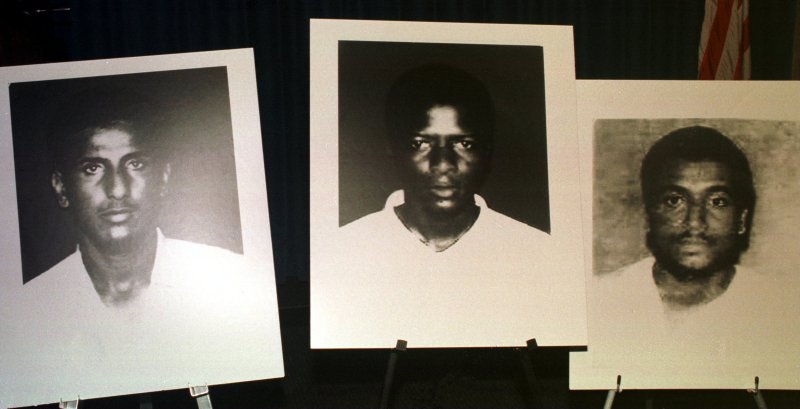1 of 3 | NYP98121607 - 16 DECEMBER 1998 - NEW YORK , NEW YORK, USA: The United States Attorney and the FBI announced December 16th the indictment of (left to right) Fahid Mohammed Ally, Ahmed Khalfan Ghailani and Khalfan Khamis Mohamed for the August 7th 1998 bombing of the United States embassy in Dar es Salaam, Tanzania. A $5 million dollar reward is being offered for the arrest and conviction of the subjects anywhere in the world. ep/wy/Ezio Petersen UPI |
License Photo
WASHINGTON, June 9 (UPI) -- One of the most important terror suspects in Guantanamo Bay is coming to America to face trial: Ahmed Ghailani, a "high-value detainee," was moved Tuesday from Guantanamo Bay to New York to face charges in federal court there. He is the first such prisoner taken to the United States.
Ghailani is accused of providing explosives used in al-Qaida's 1998 U.S. Embassy bombings in Dar es Salaam, Tanzania, and Nairobi, Kenya. More than 200 people died in the attacks. They were the most serious assault al-Qaida had made against American targets to that point. And they showed for the first time the Islamist terror group's ability to orchestrate virtually simultaneous attacks against multiple targets, inflicting hundreds of casualties. It was the success of these attacks that apparently emboldened Osama bin Laden and his cohorts to plan the atrocities of Sept. 11, 2001, that killed almost 3,000 Americans.
Ghailani has apologized for the attacks and has claimed that he didn't know of the Sept. 11 plot in advance. But the Justice Department is hitting him with everything it's got. He faces a total of 286 counts, some of which carry the death penalty. He is being separately charged for the murder of every one of the 224 people, most of them Kenyan and Tanzanian citizens, who died in the 1998 attacks.
Ghailani is also accused of "conspiring with Osama bin Laden and other members of al-Qaida to kill Americans anywhere in the world."
U.S. Attorney General Eric Holder is determined to see Ghailani convicted. "With his appearance in federal court today, Ahmed Ghailani is being held accountable for his alleged role in the bombing of U.S. embassies in Tanzania and Kenya and the murder of 224 people," the attorney general said in a statement Tuesday.
"The Justice Department has a long history of securely detaining and successfully prosecuting terror suspects through the criminal justice system, and we will bring that experience to bear in seeking justice in this case," Holder promised.
The fact that the U.S. government is starting to move prisoners from Guantanamo to U.S. court jurisdiction is a significant precedent. It indicates a serious first step by U.S. President Barack Obama and his administration to try the prisoners held in Guantanamo in the United States.
The president is determined to close the holding facility at Guantanamo within the next year, a move that will certainly be welcomed around the world. However, critics of his policy argue that having a pattern of civilian trials will be an extremely slow and costly method of proceeding. They also fear that long, public and expensive trials in major cities such as New York will themselves become potential targets for new terror attacks, in that they could be used to justify kidnappings or other reprisal atrocities.
Some critics even argue that both Obama and his predecessor, President George W. Bush, should simply follow the precedent of President Franklin D. Roosevelt in World War II and treat terror suspects as prisoners of war, holding them as regular POWs in jails or camps within the United States until the end of hostilities.
However, Bush's conception of "The Global War on Terror" was so ill-defined that it would be difficult to plausibly declare an end to it at all, while Obama has gone to the other extreme and scrapped any use of the term "war" to cover U.S. military, intelligence and legal operations against potential terrorist threats.















